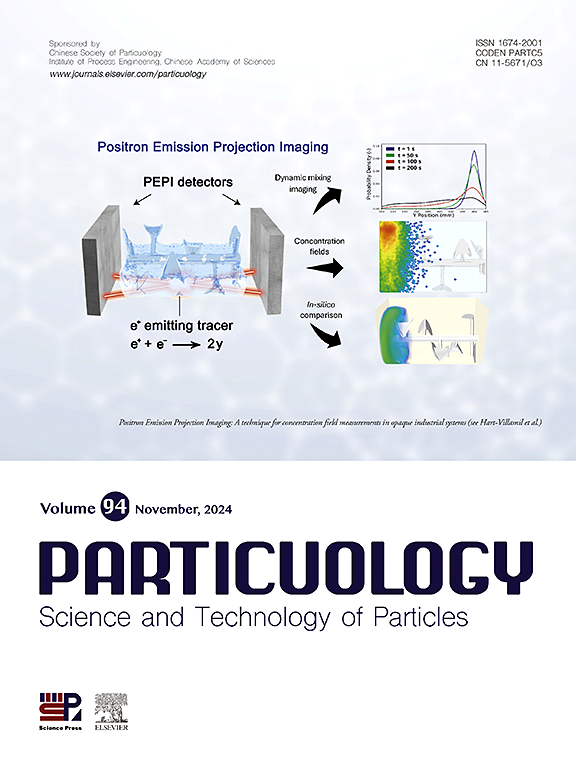Influence of internal components on gas-solid flow characteristics in fluidized bed reactor for organic silicon monomer synthesis
IF 4.1
2区 材料科学
Q2 ENGINEERING, CHEMICAL
引用次数: 0
Abstract
Internal components play a crucial role in the synthesis of organic silicon monomer in gas-solid fluidized bed reactors (FBRs). Finger-tube (F-tube) and U-tube components are commonly utilized to control the temperature and ensure its homogeneity in FBRs, thereby guaranteeing a high selectivity of the target product. The main objective of this work is to better understand the influence of F-tube and U-tube on the hydrodynamics in FBRs. Computational fluid dynamics (CFD) combined with the particle image velocimetry (PIV) technique were employed to explore the flow characteristics. The numerical data were validated against the particle velocity using an image processing technique. The results revealed that the F-tube increases the bed voidage by 3.2% and reduces the pressure drop by 13.0%. While the U-tube increases the bed voidage by 2.1% and reduces the pressure drop by 11.2%. These internals improve fluidization by ensuring even particle distribution and enhancing intra-particle circulation compared to reactors without internals.

有机硅单体合成流化床反应器内组分对气固流动特性的影响
在气固流化床反应器中,内部组分对有机硅单体的合成起着至关重要的作用。指管(f管)和u管组件通常用于控制fbr中的温度并保证其均匀性,从而保证目标产物的高选择性。本工作的主要目的是更好地了解f型管和u型管对快堆流体力学的影响。采用计算流体力学(CFD)和粒子图像测速(PIV)技术对其流动特性进行了研究。利用图像处理技术对数值数据与粒子速度进行了验证。结果表明,f型管使床层空隙增大3.2%,压降减小13.0%。u型管使床层空隙增大2.1%,压降减小11.2%。与没有内部装置的反应器相比,这些内部装置通过确保均匀的颗粒分布和增强颗粒内循环来改善流化。
本文章由计算机程序翻译,如有差异,请以英文原文为准。
求助全文
约1分钟内获得全文
求助全文
来源期刊

Particuology
工程技术-材料科学:综合
CiteScore
6.70
自引率
2.90%
发文量
1730
审稿时长
32 days
期刊介绍:
The word ‘particuology’ was coined to parallel the discipline for the science and technology of particles.
Particuology is an interdisciplinary journal that publishes frontier research articles and critical reviews on the discovery, formulation and engineering of particulate materials, processes and systems. It especially welcomes contributions utilising advanced theoretical, modelling and measurement methods to enable the discovery and creation of new particulate materials, and the manufacturing of functional particulate-based products, such as sensors.
Papers are handled by Thematic Editors who oversee contributions from specific subject fields. These fields are classified into: Particle Synthesis and Modification; Particle Characterization and Measurement; Granular Systems and Bulk Solids Technology; Fluidization and Particle-Fluid Systems; Aerosols; and Applications of Particle Technology.
Key topics concerning the creation and processing of particulates include:
-Modelling and simulation of particle formation, collective behaviour of particles and systems for particle production over a broad spectrum of length scales
-Mining of experimental data for particle synthesis and surface properties to facilitate the creation of new materials and processes
-Particle design and preparation including controlled response and sensing functionalities in formation, delivery systems and biological systems, etc.
-Experimental and computational methods for visualization and analysis of particulate system.
These topics are broadly relevant to the production of materials, pharmaceuticals and food, and to the conversion of energy resources to fuels and protection of the environment.
 求助内容:
求助内容: 应助结果提醒方式:
应助结果提醒方式:


